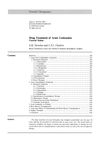 27 citations,
January 2018 in “Curēus”
27 citations,
January 2018 in “Curēus” Subcutaneous contraceptives can cause side effects like menstrual changes, headaches, weight gain, and pain at the implant site.
 53 citations,
March 2014 in “Cold Spring Harbor Perspectives in Medicine”
53 citations,
March 2014 in “Cold Spring Harbor Perspectives in Medicine” The document explains different types of hair loss, their causes, and treatments, and suggests future research areas.
 August 2016 in “Journal of Investigative Dermatology”
August 2016 in “Journal of Investigative Dermatology”  77 citations,
April 2016 in “Science Advances”
77 citations,
April 2016 in “Science Advances” Researchers created a fully functional, bioengineered skin system with hair from stem cells that successfully integrated when transplanted into mice.
 49 citations,
April 2000 in “Journal of The American Academy of Dermatology”
49 citations,
April 2000 in “Journal of The American Academy of Dermatology” Despite progress in treatment, the exact cause of Alopecia areata is still unknown.
 January 2018 in “Journal of general practice”
January 2018 in “Journal of general practice” Young people are losing hair due to stress, poor diet, pollution, and lack of sleep, but it can be treated with supplements and scalp treatments.
 38 citations,
January 2016 in “Cell Death and Disease”
38 citations,
January 2016 in “Cell Death and Disease” The TCL1 transgenic mouse model is useful for understanding human B-cell leukemia and testing new treatments.

Treatments for acute leukaemia lead to high remission rates, but relapses occur, requiring ongoing advancements in care.
 100 citations,
May 2011 in “Journal of Pediatric and Adolescent Gynecology”
100 citations,
May 2011 in “Journal of Pediatric and Adolescent Gynecology” The document concludes that proper diagnosis and a multidisciplinary approach are crucial for managing Congenital Adrenal Hyperplasia effectively.
 53 citations,
November 2006 in “Journal of Endocrinology”
53 citations,
November 2006 in “Journal of Endocrinology” Prolactin slows down hair growth in mice.

A new minoxidil regimen improved hair loss in a lupus patient.
 9 citations,
November 2018 in “Drug Discovery Today”
9 citations,
November 2018 in “Drug Discovery Today” Using skin stem cells and certain molecules might lead to scar-free skin healing.
 38 citations,
November 2000 in “Hastings Center Report”
38 citations,
November 2000 in “Hastings Center Report” The document suggests medicine should integrate biological and cultural factors and focus on holistic, equitable care.
 52 citations,
September 1996 in “Obstetrics & Gynecology”
52 citations,
September 1996 in “Obstetrics & Gynecology” People often struggle to consistently use contraceptives and other medications, and long-acting options might be better for those who want to avoid daily doses.
 185 citations,
August 2005 in “Autoimmunity Reviews”
185 citations,
August 2005 in “Autoimmunity Reviews” Alopecia areata is an autoimmune condition causing hair loss due to the immune system attacking hair follicles, often influenced by genetics and stress.
 August 2023 in “Bioengineering”
August 2023 in “Bioengineering” Bioprinting could greatly improve health outcomes but faces challenges like material choice and ensuring long-term survival of printed tissues.
14 citations,
January 2015 in “Annals of dermatology/Annals of Dermatology” Corticosteroid pulse therapy is more effective for severe alopecia areata than combination therapy.
 162 citations,
August 2004 in “Journal of Investigative Dermatology”
162 citations,
August 2004 in “Journal of Investigative Dermatology” Hair loss causes stress and affects mental health; treatment and support needed.
 1 citations,
December 2014
1 citations,
December 2014 Some drugs have gained approval for new uses, while others like tricyclic antidepressants and aspirin show promise but aren't yet approved for these uses.
 4 citations,
January 2015 in “Hair therapy & transplantation”
4 citations,
January 2015 in “Hair therapy & transplantation” Hair follicle stem cells could be used to treat the skin condition vitiligo.
 January 2024 in “Wiadomości Lekarskie”
January 2024 in “Wiadomości Lekarskie” Robotic hair transplantation with AI offers more reliable, precise, and efficient hair restoration.
 18 citations,
June 2017 in “Proceedings of the National Academy of Sciences of the United States of America”
18 citations,
June 2017 in “Proceedings of the National Academy of Sciences of the United States of America” A gene called Gk5 controls lipid production in the skin and affects hair growth.
 8 citations,
January 1996 in “Springer eBooks”
8 citations,
January 1996 in “Springer eBooks” Male pattern baldness may be caused by factors like poor blood circulation, scalp tension, stress, and hormonal imbalances, but the exact causes are still unclear.
 281 citations,
January 2013 in “British Journal of Dermatology”
281 citations,
January 2013 in “British Journal of Dermatology” Manage vitiligo with treatments, address emotions, and use camouflage techniques.
 137 citations,
April 2015 in “Nature Reviews Molecular Cell Biology”
137 citations,
April 2015 in “Nature Reviews Molecular Cell Biology” Different types of stem cells with unique roles exist in blood, skin, and intestines, and this variety is important for tissue repair.

New treatments for hair loss show promise, including plasma, stem cells, and hair-stimulating complexes, but more research is needed to fully understand them.
 28 citations,
January 2016 in “Vitamins and hormones”
28 citations,
January 2016 in “Vitamins and hormones” Thymosin β4 helps improve skin healing and reduce scarring.
 157 citations,
April 1994 in “Clinical endocrinology”
157 citations,
April 1994 in “Clinical endocrinology” Androgens can cause hair growth in some areas and hair loss on the scalp.
 12 citations,
November 2014 in “Journal of Cutaneous Medicine and Surgery”
12 citations,
November 2014 in “Journal of Cutaneous Medicine and Surgery” Antiviral medication valganciclovir may improve skin and hair in Trichodysplasia Spinulosa patients.
 63 citations,
May 2000 in “Australasian Journal of Dermatology”
63 citations,
May 2000 in “Australasian Journal of Dermatology” Chemotherapy and bone marrow transplant can cause permanent hair loss.





























